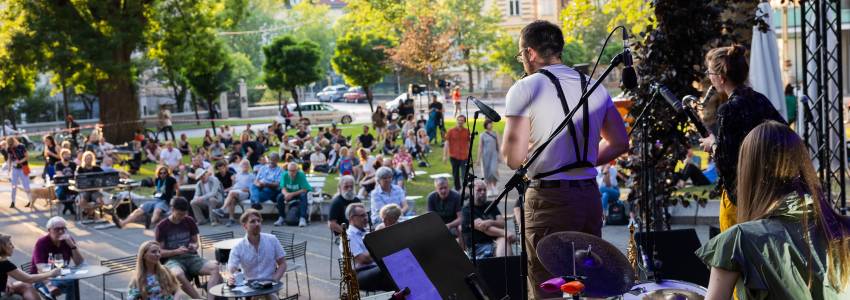Beehives on Cankarjev dom’s Rooftop
Bees play an important role in maintaining ecological balance and natural biodiversity. Bees are pollinators of most plants and an important link to the natural balance and existence of life on Earth. Urban beekeeping at Cankarjev dom was launched in April 2011 when so-called stacking beehives were first installed on one of our cultural centre’s roof terraces on the initiative of Cankarjev dom’s employee Franc Petrovčič, a recipient of the Anton Janša Decoration (Order III). In the beginning, our hives were home to three colonies of Carniolan bees, while today, during peak reproductive seasons, our bees can reach a high of about 500,000. The quality of the honey made by Cankarjev dom’s bees is assessed and validated by a reference laboratory in Bremen where the honey is sent for an annual analysis. Cankarjev dom holds the Slovenian Beekeepers’ Association Certificate of Entry into the Register of Producers of Slovenian Honey with a Protected Designation of Origin.
The annual honey harvest at CD depends on the number of bee families and the weather conditions when the flowers are in full bloom. Nevertheless, CD tends to produce 20 kilograms of honey per bee family each year. Approx. 10,000-15,000 bees survive winter, in March new broods hatch, and a height is reached in midsummer when each hive provides a home for 50,000 bees. Bees in the city also increase biodiversity by pollinating urban plants. In the urban environment, grazing is favourable to bees; although it may not appear so at first sight, there are many trees, groves, and gardens in the city. Cankarjev dom’s bees have immediate access to the Tivoli Park, the Castle and Rožnik hills, urban ornamental plants and numerous tree-lined alleys. In pollinating urban plants bees help increase the city’s biodiversity.
Cankarjev dom celebrates World Bee Day each year on 20 May, and since 2015 has been member of Ljubljana’s Bee Path, a project launched by the Municipality of Ljubljana.
The Path is dedicated to the well-being of urban bees and raising awareness about the importance of bees in our ecosystem.



